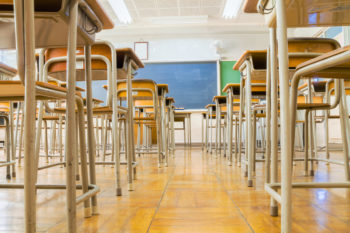
Key measures used to rank schools in England artificially inflate levels of performance in faith schools and ‘punish’ schools with high proportions of deprived pupils, according to University of Bristol researchers.
Humanists UK – which has long campaigned for greater acknowledgement of the extent to which pupil background and prior attainment skew Government league tables in favour of religious schools – today welcomed calls by Dr. George Leckie and Professor Harvey Goldstein for the introduction of a new measure to be published alongside the current metric used to rank schools known as Progress 8.
Progress 8, which was introduced in 2016 and underpins new secondary league tables published by the Department for Education today, was designed to measure pupil progress in 8 key subjects over the course of secondary education. However, while Progress 8 compares pupil results with others who achieved the same score in assessments at the end of primary school, it entirely ignores other important factors that are likely to impact upon educational attainment.
In contrast, Leckie and Goldstein’s new measure – ‘Adjusted Progress 8’ – takes account of a range of pupil characteristics including ethnicity, language, special educational needs (SEN), free school meal eligibility, and levels of deprivation.
This leads to ‘dramatic changes’ in the average pupil progress scores of faith schools which, ‘[reduce] substantially once the educationally advantaged nature of their pupils is taken into account.’
Humanists UK Education Campaigns Manager Ruth Wareham said:
‘We have long been aware that the metrics used to compile national league tables benefit schools with advantaged pupil intakes. Unfortunately, the perception that a higher ranking in these tables means a school is superior to those lower down is often used by proponents of religious schools to promote the spurious claim they offer better quality education and that we should, therefore, open more such schools.
‘This is evidently wrong. The adjusted measure demonstrates that differences between the performance of religious schools and those without a religious character have far more to do with the characteristics of the pupils these schools admit than the quality of education they offer. If religious schools were forced to become more inclusive, we would soon see the myth that faith schools are “naturally better” fade away for good.’
NOTES:
Show your support for our work by making a donation to our faith schools fundraiser: https://www.justgiving.com/nofaithschools
For further comment or information, please contact Humanists UK press manager Casey-Ann Seaniger at casey@humanists.uk or phone 020 7324 3078.
To read about our campaign to prevent 100% religiously selective voluntary aided schools and find out about how you can take action see:
https://humanists.uk/campaigns/vaschools/
For more information about our faith schools campaign work, visit https://humanists.uk/campaigns/schools-and-education/faith-schools/
At Humanists UK, we advance free thinking and promote humanism to create a tolerant society where rational thinking and kindness prevail. Our work brings non-religious people together to develop their own views, helping people be happier and more fulfilled in the one life we have. Through our ceremonies, education services, and community and campaigning work, we strive to create a fair and equal society for all.
